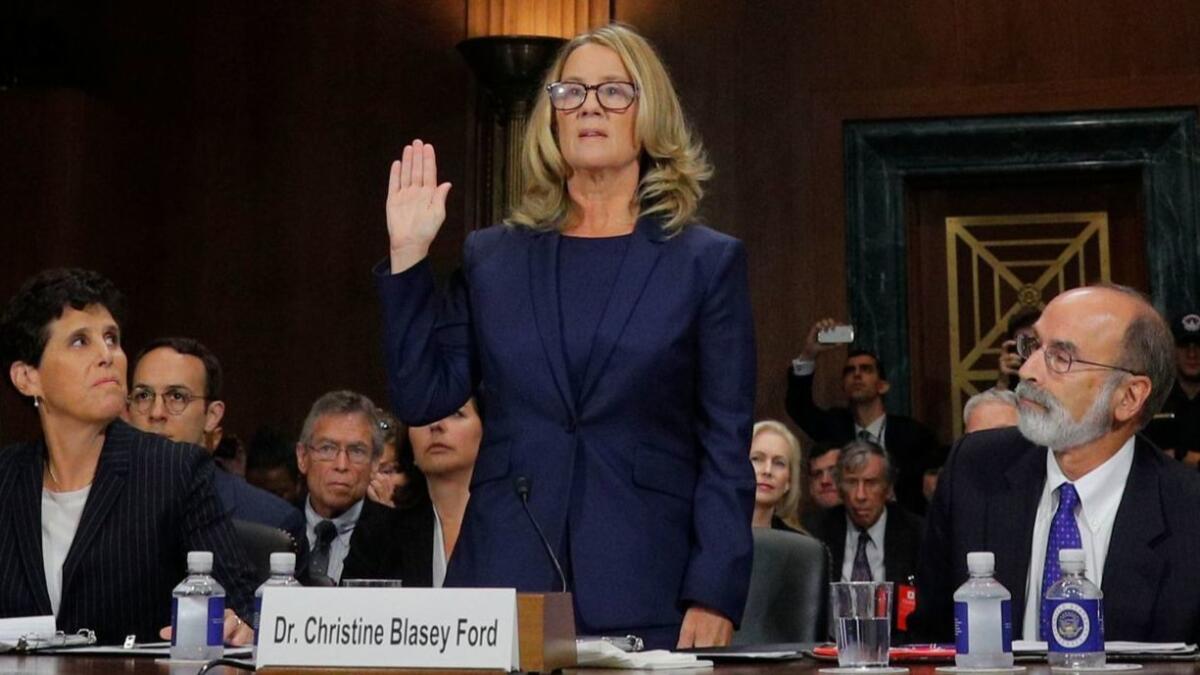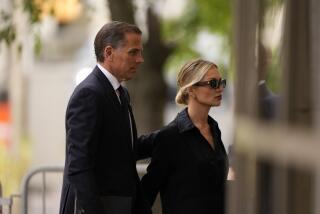Former FBI agents say there are clues to follow from dramatic Kavanaugh hearing

- Share via
Reporting from Washington — Former FBI officials expressed confidence Friday that agents could quickly interview key witnesses and track down potential leads into Christine Blasey Ford’s allegations that Supreme Court nominee Brett Kavanaugh sexually assaulted her when they were both high school students in the early 1980s.
Doing so might offer greater clarity than the dueling but inconclusive testimony that emerged in a wrenching Senate hearing on Thursday from the 51-year-old California professor and the 53-year-old federal judge.
For the record:
6:20 p.m. Sept. 28, 2018An earlier version of this story contained descriptions of a house in Rockville, Md., that appeared to be the home of Tim Gaudette and his family in July of 1982. It is unclear whether the building is the correct house so descriptions of it have been deleted from this story.
Ford said she was “100%” certain Kavanaugh had tried to rape her, and Kavanaugh said he was “100%” certain he had never sexually abused Ford or anyone else, leaving senators to decide for themselves who was telling the truth.
Senate Republican leaders agreed Friday afternoon to seek a supplemental FBI background inquiry of Kavanaugh, limited to “current credible allegations” and with a one-week deadline, in an abrupt reversal of their previous refusal to permit further investigation.
They backed down after two potential swing votes in the closely divided Senate — Republicans Jeff Flake of Arizona and Lisa Murkowski of Alaska — suggested they would not vote to confirm Kavanaugh until the FBI is given time to probe Ford’s allegations.
Republican leaders moved ahead with a procedural vote on the nomination Friday evening.
Over nearly nine hours of often grueling testimony Thursday, Ford and Kavanaugh provided several details and clues — from names of witnesses to dates and places — that experienced investigators now can chase down.
“There is plenty of lead value in the testimony that was provided during the confirmation hearing and there are plenty of living witnesses that can be identified, contacted and interviewed,” said James McJunkin, a former top FBI official. “They can do this fairly quickly.”
Information from the hearing could provide “crumbs agents could follow,” said Bobby Chacon, a former FBI agent who retired in 2014. “There might less than a handful of interviews they may want to do and follow up.”
FBI spokeswoman Jacqueline Maguire declined to comment.
Ford’s dramatic testimony and details scrawled on the calendars Kavanaugh said he kept from the summer of 1982, when Ford believes the alleged assault occurred, offered promising lines of inquiry, the former officials said.
Among other clues, Ford provided the names of several potential witnesses to her account, including two classmates of Kavanaugh’s at Georgetown Preparatory School in the Washington suburbs.
The friends, Mark Judge and Patrick Smythe, have said in statements that they do not recall the party or the alleged assault. Ford testified that Smythe attended the party and that Judge was present in the bedroom when Kavanaugh groped her and covered her mouth to muffle her screams.
In a letter to the Senate Judiciary Committee on Friday, Judge wrote that he would “cooperate with any law enforcement agency that is assigned to confidentially investigate these allegations.”
Ford said Leland Ingham Keyser, a classmate of hers, was present at the party, although not in the room; Keyser has said through her lawyer that she did not recall the gathering and did not know Kavanaugh.
If the FBI gets involved, agents would probably focus their first interviews on Ford, Kavanaugh, Judge, Smythe and Keyser, former agents said. They would then expand the circle as they developed leads.
Former agents noted that Kavanaugh’s calendar entries from 1982 could help provide timelines and additional witnesses. They noted, for example, a calendar entry on July 1 of a party with several friends, including Judge and Smythe.
Kavanaugh confirmed in his testimony that Chris Garrett, a Georgetown Prep classmate, was at that gathering. Ford testified that Garrett had introduced her to the future judge.
The party was at the home of another Georgetown Prep classmate, Tim Gaudette, according to Kavanaugh’s calendar and testimony. Gaudette did not return text messages or respond to messages left on his voicemail.
Ford told the committee that she drank a beer at the house, and then went upstairs to use the bathroom. At the top of the stairs, she testified, she was pushed into a bedroom across the hall.
During the following assault, she said, Kavanaugh pinned her down and groped her. She escaped after Judge jumped on the bed and they all tumbled to the floor, she testified. She said she ran out of the room and into the bathroom across the hall.
The FBI does not typically investigate crimes that are handled by local authorities, such as sexual assault.
Agents do, however, conduct background investigations on presidential nominees to determine if they are a threat to the United States or a security risk. They submit reports of their investigations to administration officials for consideration.
The White House tapped the bureau in 1991, for example, to look into Anita Hill’s allegations that she was sexually harassed at work by Clarence Thomas, who was later confirmed to the Supreme Court.
In a letter, the police chief and state attorney in Montgomery County, where the assault allegedly occurred, said they would not investigate the incident without a complaint from Ford. They also noted they could do little to prosecute such a case — assault and attempted rape were misdemeanors in 1982 and subject to a one-year statute of limitations.
More to Read
Get the L.A. Times Politics newsletter
Deeply reported insights into legislation, politics and policy from Sacramento, Washington and beyond. In your inbox three times per week.
You may occasionally receive promotional content from the Los Angeles Times.











